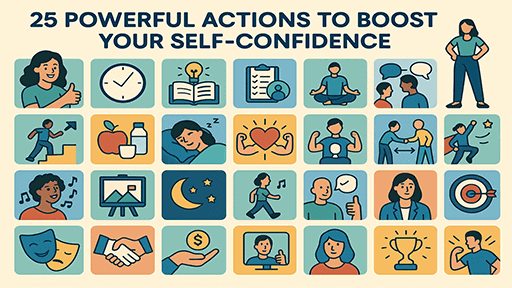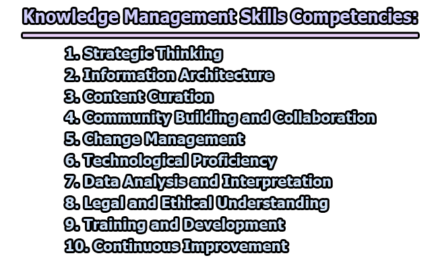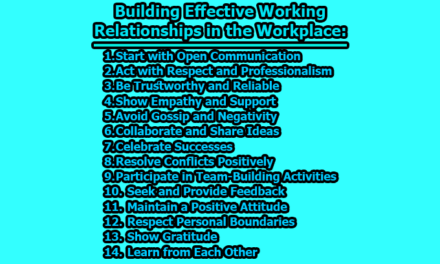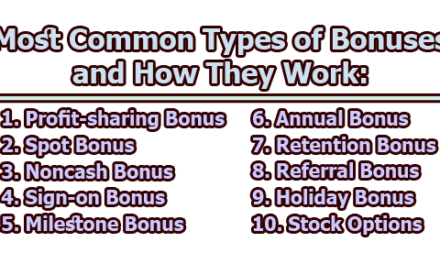25 Powerful Actions to Boost Your Self-Confidence:
Confidence isn’t something we’re born with. It’s something we build. For many people—including myself—fear of failure has often held us back more than lack of talent or opportunity ever could. At the root of this fear is often a shaky belief in our own ability to succeed. But what if I told you that self-confidence is a skill? Something that can be strengthened like a muscle. It’s not reserved for the bold or the gifted—it’s available to everyone who’s willing to put in the work. Whether you want to chase your dreams, live more authentically, or simply feel better in your own skin, boosting your confidence can change the course of your life. Here are the 25 powerful actions to boost your self-confidence.
“Once we believe in ourselves, we can risk curiosity, wonder, spontaneous delight, or any experience that reveals the human spirit.” – E.E. Cummings
- Groom Yourself: Let’s start with something simple—but powerful. Grooming isn’t just about appearance; it’s about self-respect. Taking a shower, brushing your teeth, shaving (or trimming your beard), doing your hair—these small rituals remind you that you matter. They signal to your brain: I’m worth taking care of.
Think about a day when you felt sluggish or low. Chances are, you may have skipped your usual grooming routine. Now remember how different you felt on a day when you looked sharp and fresh. That extra boost in your step? That came from caring for yourself. You don’t need to wait for a special occasion—make grooming a daily act of self-love.
- Dress Nicely: You don’t need a designer wardrobe to feel confident. But you do need to wear clothes that make you feel put-together and comfortable in your own skin. Dressing nicely doesn’t mean flashy or expensive—it means clean, neat, and something that fits your personality.
When you take the time to dress well—even if you’re just heading to the grocery store—you project a message to yourself and others: I’m confident. I’m capable. It subtly changes how you walk, how you speak, and even how others respond to you. Try it. Wear your favorite outfit and notice how your mood changes. It’s not vanity—it’s empowerment.
- Photoshop Your Mental Self-Image: We all have an internal image of ourselves. Sometimes it’s shaped by past failures, critical voices from childhood, or moments where we felt “less than.” The trouble is, we start to believe that image as truth. But it isn’t.
The good news? You can revise that internal picture. Just like you’d edit a photo, you can work on your self-perception. Start by noticing how you speak to yourself. Do you call yourself “lazy,” “awkward,” “not good enough”? Pause. Replace that language with something more compassionate: “I’m learning,” or “I’m doing my best.” Over time, those small adjustments help you see yourself more clearly—and more kindly. Your self-confidence begins with how you see yourself.
- Think Positive: This one’s not about pretending everything is perfect. It’s about recognizing that you have the power to shift your mindset. When you face a challenge, you can say, “I’ll never be able to do this,” or you can say, “This is hard, but I’ll find a way.”
Positive thinking doesn’t mean ignoring reality—it means choosing a perspective that keeps you moving forward. I once trained for a marathon after being a total non-runner. The biggest shift wasn’t in my legs—it was in my mind. I learned to replace “I can’t do this” with “Let me see how far I can go today.” That single change in thought transformed the entire journey. Try it with your own goals—you’ll be surprised by what becomes possible.
- Kill Negative Thoughts: Your mind is constantly talking to you. The problem is, sometimes it says things that aren’t helpful—like, “You’re not smart enough,” or “You’ll never pull this off.” Left unchecked, these thoughts can destroy your confidence from the inside out.
So what can you do? Become a mental bug-catcher. When you hear a negative thought pop up, stop and say, “Ah, there’s one!” Then mentally squash it, like stepping on a bug. Replace it with something better: “I’m capable.” “I’ve done hard things before.” “Let’s give it a shot.” This may feel awkward at first, but it works. With practice, you’ll train your brain to support you instead of sabotage you.
- Get to Know Yourself: You can’t build confidence if you don’t truly understand who you are. Most of us go through life on autopilot, reacting to situations without stopping to reflect. But the journey to greater self-confidence starts with deep self-awareness.
Start paying attention to your inner voice. What are your recurring thoughts, especially when you’re stressed or afraid? What patterns do you notice in how you respond to challenges? Keep a journal—not to document your day, but to explore your thoughts and feelings. Ask yourself honest questions: Why do I think I can’t do this? Where did this belief come from? Is it really true?
At the same time, write about what you’re good at, what excites you, and what you value most. Understanding your strengths and your struggles gives you clarity. Clarity breeds confidence. When you truly know yourself—flaws, quirks, and all—you stop trying to be someone else. And that is incredibly freeing.
- Act Positive: It’s not enough to think positively—you have to act like a confident person too. This doesn’t mean faking it, but it does mean pushing yourself to behave in ways that align with who you want to become.
Say “hello” to someone instead of avoiding eye contact. Take initiative at work or in class. Volunteer to lead a small task. Smile, walk with purpose, sit in the front row, speak up in meetings. These are small actions, but they carry big power.
Behavior shapes belief. The more you act like someone who believes in themselves, the more your brain begins to accept that identity as truth. Before long, you’ll start to feel the confidence that once felt out of reach.
- Be Kind and Generous: It might sound strange, but helping others is one of the most powerful ways to feel better about yourself. Why? Because being kind affirms that you have value to offer—and that builds self-worth.
Send someone a kind message. Hold the door for a stranger. Help a colleague without being asked. Give your full attention when someone is speaking. These moments may seem small, but each one reinforces the idea that you are a good, capable, and compassionate person.
Kindness also pulls you out of your own head. When you’re focused on making someone else’s day better, your self-doubt takes a back seat. You reconnect with your humanity—and that alone can lift your confidence.
- Get Prepared: Nothing drains confidence faster than feeling unready. If you’re walking into a test, a job interview, or a big presentation unprepared, of course you’ll feel anxious. But preparation is your secret weapon.
When you prepare, you arm yourself with knowledge and strategy. You reduce uncertainty, which lowers fear. Whether it’s practicing a speech, researching a topic, or organizing your notes, the effort you put in ahead of time sends this message to your brain: I’ve got this.
Confidence doesn’t come from perfection—it comes from preparation. And preparation is always in your control.
- Know Your Principles and Live Them: Confidence isn’t just about doing well in public—it’s also about living well in private. A big part of that is knowing what you stand for. What are your personal values? What kind of person do you want to be?
If you’re not sure, take some time to reflect. Maybe honesty, kindness, creativity, or perseverance come to mind. Once you know your values, the next step is to align your actions with them.
When you live according to your principles—even when it’s hard—you feel proud of who you are. You feel consistent. And that integrity creates a deep, lasting kind of confidence. It’s the kind that doesn’t depend on what others think of you—because you already know what you think of yourself.
- Speak Slowly: This might seem like a small thing, but it sends a big message—to others and to yourself. People who speak slowly and clearly are often perceived as confident and in control. They don’t rush their words because they believe what they’re saying is worth hearing.
On the other hand, when we’re nervous or unsure, we tend to speed up—almost as if we want to get it over with before someone notices we’re afraid. But when you slow down your speech, you create space. You give weight to your words. You sound thoughtful, composed, and self-assured—even if you don’t feel that way just yet.
Try it. In your next conversation, take a breath before speaking. Pause between sentences. You may be surprised how much calmer and more confident you come across—and feel.
- Stand Tall: Your body language speaks volumes. Before you say a single word, the way you carry yourself sends a signal: confident or unsure, strong or small. One of the quickest ways to shift into confidence mode? Straighten up.
When you stand tall—shoulders back, chin up—you literally take up more space in the world. It’s not about arrogance. It’s about owning your presence. Even if you’re nervous on the inside, this physical change can trick your brain into feeling more in control.
If you catch yourself slouching or shrinking, pause. Imagine a string pulling the top of your head gently upward. Feel your spine lengthen. Breathe deeply. You just changed your posture—and maybe your mindset too.
- Increase Competence: Confidence and competence go hand in hand. One of the best ways to feel better about yourself is to get better at something. It doesn’t matter what—writing, cooking, public speaking, playing guitar, coding. When you invest time and energy into improving, you naturally start to trust yourself more.
You don’t have to be perfect. You just need to see progress. Even five minutes a day of focused practice can make a difference over time. The key is consistency. Confidence doesn’t come from talent alone—it comes from effort, learning, and proving to yourself that you’re capable of growth.
So ask yourself: What’s one skill I’d like to get better at? Then make a plan. Start small. Stick with it. And let your growing competence fuel your confidence.
- Set a Small Goal and Achieve It: Big goals are inspiring—but they can also be intimidating. When you set the bar too high too soon, failure feels inevitable. And that can crush your confidence.
Instead, start small. Choose one doable task—something you know you can accomplish. Maybe it’s organizing your desk, replying to that one email you’ve been avoiding, or going for a 10-minute walk. The point is to start and finish something, no matter how small.
Each time you complete a goal, you send a message to your brain: I follow through. I can do this. That builds trust in yourself. And as that trust grows, so does your confidence. Over time, those small wins add up to big changes.
- Change a Small Habit: When we think about changing our lives, we often go too big—“I’m going to quit sugar, go to the gym every day, write a book, and meditate for an hour!” That kind of thinking sets us up for burnout and disappointment.
Instead, focus on one tiny habit you can change. Wake up 10 minutes earlier. Drink water first thing in the morning. Put your phone away during meals. These small shifts may seem insignificant, but they create a ripple effect.
Why does this matter for confidence? Because changing even one habit reminds you that you are capable of change. That you have power over your life. And when you prove to yourself that you can follow through, even on a small habit, you start to believe in yourself more—and that’s where real confidence is born.
- Focus on Solutions: It’s easy to get stuck in a cycle of complaining or obsessing over problems. We all do it sometimes. But here’s the truth: constantly focusing on what’s wrong drains your energy and your confidence.
The shift happens when you train your brain to look for solutions instead. For example, instead of saying, “I’m so overwhelmed,” ask, “What’s one thing I can do right now to feel more in control?” Instead of, “I’m terrible at this,” try, “What can I do to improve, even just a little?”
It’s not about having all the answers. It’s about changing your role from passive victim to active problem-solver. That shift in mindset—even if small—builds belief in your ability to handle life. And that’s the essence of confidence: believing you can figure things out.
- Smile: Yes, this one sounds cheesy. But don’t underestimate its power. Smiling, even when you don’t feel like it, can actually trigger a positive feedback loop in your brain. It tells your body, “Hey, something good is happening,” even if nothing’s changed—yet.
The act of smiling can lift your mood, reduce stress, and make you more approachable to others. And when people respond to you positively, it boosts your confidence even more. It’s a small action that can change the tone of your day.
So the next time you catch your reflection, or walk into a room, or start a Zoom call—smile. Not a fake grin, but a soft, genuine one. You might be surprised how much lighter and more capable you feel.
- Volunteer: When you give your time, energy, or skills to help others, something amazing happens—you start to see your own value in a new light. You realize you can make a difference. You matter. That’s a powerful feeling, especially when you’re feeling low or lost.
Volunteering isn’t just for the holidays or big organizations. You can help a neighbor, mentor a student, assist in a local library, or clean up your community. The goal isn’t recognition—it’s connection. With others, and with the meaningful parts of yourself.
Giving back reminds you that you have something to offer the world. And when you see your own impact, even in small ways, it reinforces your self-worth—and naturally boosts your confidence.
- Be Grateful: Gratitude is one of the most overlooked tools for building confidence. When you focus on what you have, instead of what you lack, you change the entire tone of your inner voice. Instead of, “I’m not good enough,” you start to think, “Look at everything I’ve come through. Look at what I do have.”
Gratitude grounds you. It helps you stop chasing validation from the outside and start appreciating your life—and yourself—from the inside. Try writing down three things you’re grateful for each morning. They can be big (your health, your family) or small (a good cup of tea, sunshine, clean clothes).
This practice doesn’t erase your problems—but it does give you perspective. And confidence thrives on perspective.
- Exercise: You’ve probably heard this one a hundred times, but that’s because it works. Exercise isn’t just good for your body—it’s amazing for your mind. When you move your body, even with something as simple as a walk, your brain releases chemicals like endorphins and serotonin. These boost your mood and reduce anxiety, two things that often drag down confidence.
But there’s something even deeper at play. When you stick to an exercise routine, no matter how small, you prove to yourself that you can follow through. That you can make yourself a priority. That you deserve to feel strong and capable.
You don’t have to join a gym or run 5 miles. Start with stretching, dancing in your room, or walking around the block. Whatever gets you moving, do it—and watch how it starts to change the way you see yourself.
- Empower Yourself with Knowledge: One of the surest paths to self-confidence is knowledge. When you know something—really know it—you feel more capable and in control. Whether it’s learning a new skill, understanding a topic that’s been intimidating you, or simply reading about something that interests you, expanding your knowledge gives you a mental edge.
Think of it this way: confidence grows when uncertainty shrinks. And what shrinks uncertainty? Information. So take the time to learn. Watch videos, read books, take an online course, ask questions. Learn from people you admire. Fill your mind with tools that support your goals and growth.
The more you know, the more you feel equipped to handle challenges. You don’t have to be an expert in everything—but you do need to invest in your growth. That’s how you step into your power.
- Do Something You’ve Been Procrastinating On: We all have that one thing sitting on our to-do list that haunts us—an email we haven’t sent, a call we’ve been avoiding, a task we keep pushing to tomorrow. The longer we avoid it, the heavier it gets, and it starts to chip away at our self-trust.
Here’s the secret: the minute you finally do that thing, you feel lighter. Your energy shifts. That weight lifts. And your confidence gets a boost—not because the task was massive, but because you followed through.
Confidence is often built in the quiet moments when you choose action over avoidance. So look at your list today. Pick one thing you’ve been avoiding. Start with five minutes. And let that momentum carry you forward.
- Get Active: Sometimes, the best thing you can do for your confidence is to simply move. Not just physically (though that helps), but in life. Make a phone call. Try a new activity. Start a project. Take a small risk.
Inaction feeds self-doubt. It keeps you stuck in your head, imagining all the ways things could go wrong. But when you do something—anything—you shift from passive to proactive. And that shift is powerful.
Yes, you might make mistakes. Yes, you might stumble. But every step forward teaches you something. Every action proves to you that you’re not helpless—you’re a participant in your life. And that realization is a game-changer for your confidence.
- Work on Small Things: Big goals can be overwhelming. You may want to launch a business, write a book, or completely transform your life—but those things don’t happen overnight. They happen in tiny steps.
So break things down. Focus on small wins. Organize one drawer. Write one paragraph. Save one dollar. Each small task you complete builds your sense of capability. It reminds you that progress is happening, even if it’s slow.
Confidence doesn’t require perfection—it requires momentum. When you focus on small, manageable pieces, you stay motivated and less likely to burn out. Over time, those little wins create big results—and a deep belief in yourself.
- Clear Your Desk: This might seem almost too simple, but don’t underestimate it. Your physical space often reflects your mental space. A cluttered desk or a messy room can create a sense of chaos and overwhelm, even if you’re not aware of it.
When you take a few minutes to tidy up, throw away the trash, or sort your workspace, you gain a small sense of control. It’s a visual reminder that you can create order. That you have the ability to reset and refocus.
This isn’t just about aesthetics—it’s symbolic. Every time you clear your space, you send yourself the message: I care about my environment. I care about myself. I am capable of creating clarity. It’s a subtle but effective confidence booster.
Final Thoughts (Confidence is Your Secret Superpower):
“Somehow I can’t believe that there are any heights that can’t be scaled by a man who knows the secrets of making dreams come true… They are curiosity, confidence, courage, and constancy, and the greatest of all is confidence.” – Walt Disney
Confidence isn’t about arrogance, perfection, or pretending you’ve got it all figured out. It’s about trusting yourself enough to show up fully and try—even when things feel uncertain.
You don’t have to do all 25 of these actions at once. Choose just one or two that resonate with you, and begin today. Start where you are, use what you have, and do what you can.
The most important thing to remember? You can do it.
Believe in that—even just a little—and your confidence will begin to grow.
Frequently Asked Questions (FAQs):
How long does it take to build self-confidence?
Building confidence isn’t a one-time event—it’s a process. For some, progress can be seen in a few weeks; for others, it might take months. It depends on your starting point, consistency, and willingness to step outside your comfort zone. The key is to focus on small, consistent actions. Over time, these build lasting change.
Can introverts be confident too?
Absolutely. Confidence doesn’t mean being loud or outgoing. It means trusting in your abilities and feeling comfortable in your own skin. Introverts can be deeply confident—often in quiet, calm, and focused ways. Confidence is personal, not performative.
What if I try something and fail—won’t that hurt my confidence?
Failure is part of building real confidence. When you fail and keep going, you learn that mistakes aren’t the end—they’re just part of the process. Confidence isn’t about always getting things right; it’s about knowing that you’ll be okay even when things go wrong.
Which activity from the list should I start with first?
Start with the one that feels easiest or most relevant to you right now. That might be smiling more, cleaning your desk, setting a small goal, or even just standing up straighter. Pick one, take action today, and build from there.
Is faking confidence a bad idea?
Not at all—as long as you’re using it as a bridge, not a mask. “Acting as if” can help your brain and body practice what confidence feels like. Over time, that fake confidence often becomes real, because you start experiencing real results and feedback.
Can I build confidence without changing who I am?
Yes—and you should. Confidence isn’t about becoming someone different. It’s about becoming more of who you already are, without fear or self-doubt holding you back. It’s about embracing your uniqueness, not hiding it.
I’m confident in some areas but not others. Is that normal?
Totally normal. Most people feel confident in certain roles or settings (e.g., at work or around friends) but uncertain in others (e.g., public speaking or dating). Confidence is contextual. The goal is to grow it where it’s missing—not to feel 100% confident all the time.
Can physical appearance affect confidence?
Yes, but not in the way many people think. Confidence isn’t about looking a certain way—it’s about how you feel about yourself. When you care for your body (e.g., through grooming, exercise, dressing well), you tend to feel better about yourself. But it’s the self-care—not the appearance—that builds confidence.
What should I do if people around me constantly bring me down?
Surrounding yourself with positive, supportive people is crucial. If others constantly criticize or belittle you, it can erode your self-belief. Set boundaries where you can, and make space for relationships that build you up, not tear you down. Your environment matters.
Can therapy or coaching help with confidence issues?
Absolutely. If low confidence is deeply rooted in past experiences, trauma, or long-term patterns, a therapist or coach can help you understand those roots and develop healthier self-beliefs. Professional support can be a powerful step toward lasting change.

Library Lecturer at Nurul Amin Degree College










